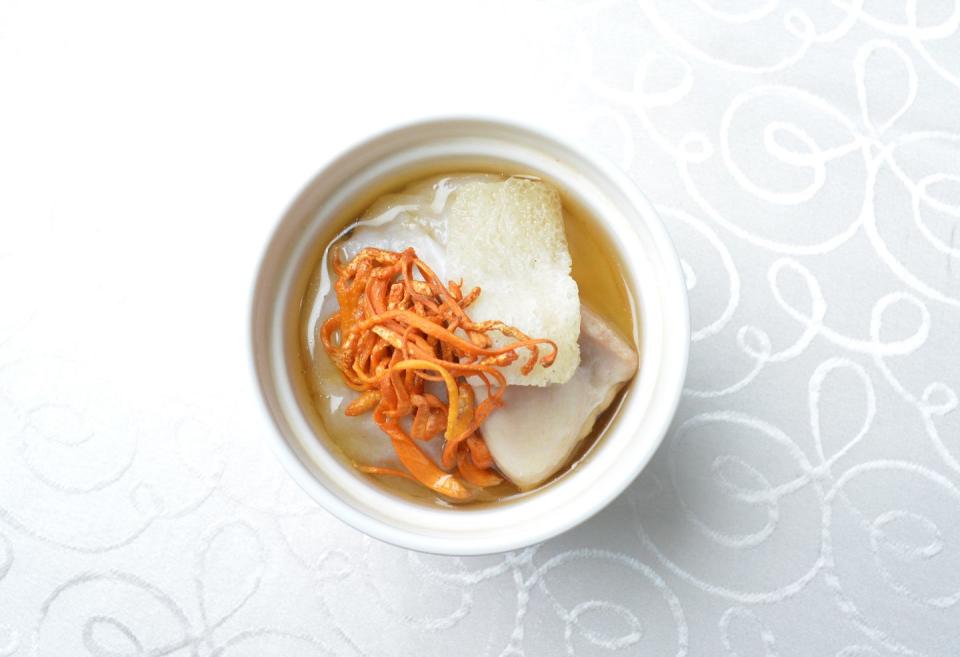The fungus from 'The Last of Us' is actually real, but is it a threat to humans?

If you’re a Pedro Pascal fan (and who isn’t?), you’ve probably watched (or tried to watch) the hit HBO show, The Last of Us.
Based on the popular video game, this terrifying TV drama depicts a global pandemic in which victims’ brains get taken over by a parasitic fungal infection, which turns them into people-munching zombies. At the root of the pandemic is an evolved form of the cordycepsmushroom, parasitic fungi that include hundreds of different species.
Relax, though – IRL, cordyceps may actually be pretty great for you. 'In general, the benefits of cordyceps are tied to endurance and athletic performance,' says Eleanora N. Gafton, DCN, MS, associate professor and doctor of clinical nutrition at Maryland University Integrative Health in Laurel, MD. 'Cordyceps also work to boost immune cells, and can be helpful for those going through chemotherapy.' What’s more, a study by Saudi Arabian researchers found that cordycepin, a bioactive component in Cordyceps, has the potential of preventing or treating many diseases, including cancer, diabetes and heart disease, as well as viruses.
Here’s everything you need to know about how to use this potentially magical mushroom–and important guidance when it comes to taking Cordyceps safely.
What is Cordyceps?
It is real, and it's sometimes called the 'zombie-ant fungus', because it mainly affects, well, ants (and spiders). According to the National Library of Medicine, Cordyceps is a composite of a fungus that grows on the larva of insects, basically taking over their bodies. But it can't jump to humans. According to data from Yale School of Medicine, because humans have evolved, and have a high enough body temperature, inhaling this kind of fungal spore has no effect on us. So no reason to freak out!

Cordyceps has been classified as a tried-and-true herbal drug for over 300 years. In Chinese medicine, it’s considered to be an important remedy for providing energy and supporting healthy sexual function. 'Cordeyceps is found in the highlands of China, Tibet, and Nepal, and it’s extremely expensive and rare,' says Gafton. Some of its properties include D-mannitol, polysacchides and 18 different amino acids. 'And it’s rich in micronutrients and vitamins,' Gafton adds
Potential health benefits
'These mushrooms may support health through a variety of pathways, including antioxidant effects and stimulation of the immune system,' says Christopher D’Adamo, PhD, assistant professor of family and community medicine, epidemiology and public health at the University of Maryland School of Medicine in Baltimore. Human studies are more limited, but have shown some benefits potentially during transplant surgery, while
Studies not done in humans have revealed reductions in stress and fatigue, and activity against several cancers, including breast cancer, says Dr. D'Adamo.
In addition to its possible potential as a tool against breast cancer, Cordyceps can be especially useful for women dealing with menopause symptoms. ;Women can expect anti-aging benefits,' says Sue-Ellen Anderson-Haynes, MS, RDN, national spokesperson for the American Dietetic Association. 'Cordyceps has adaptogen properties, which means they may assist with the optimal function of progesterone, estrogen and cortisol. In addition, it further supports hormone health for women by providing estrogen balance due to its phytoestrogen properties.'
Another key plus of the hormonal power of Cordyceps: it may boost your libido, which can be a big help during perimenopause and menopause.
There’s some evidence that Cordyceps could also prevent menopausal weight gain. Korean researchers found, in an animal study, that an extraction of Cordyceps was able to regulate both obesity- and menopause-related pathways in the body, which could have significant value for women in the future, though more studies are needed.
Side effects
You should only take Cordyceps if your doctor gives you the go-ahead for a specific condition or health goal. There's not a lot of information regarding the long-term health effects of the ‘shroom. 'Cordyceps are recommended for a year, but not indefinitely,' says Gafton.
According to data from Memorial Sloan Kettering Cancer Center, no major side effects related to Cordyceps have been reported. However, there has been a case report of excessive bleeding after a dental procedure in a patient taking Cordyceps, and Cordyceps could have a hypoglycemic effect, which is important to know if you take insulin.
Precautions
You shouldn’t take Cordyceps if you have cancer or diabetes.
It’s also not recommended that women take Cordyceps during pregnancy or while breastfeeding, "due to its unknown interactions with your baby," says Anderson-Haynes.
In addition, Cordyceps are a blood thinner and immune system stimulant, so be cautious if you’re taking immunosuppressants and blood thinners or coagulants.
Dosage
'Ideally, you would get wild foraged Cordyceps, but these are very hard to find, and would be very expensive if you did find them,' says D’Amato. Cordyceps are edible; some people consume them in tea, for example. However, for best results, and to make sure you are getting the right amount of Cordyceps, supplements are best. (Important to keep in mind: Supplements are not regulated by the FDA, and quality can vary widely.)

There are many supplements on the market, but you have to pick your product carefully. 'Typical doses would be a few grams of powdered extract per day,' says D’Amato. 'I suggest choosing an organic powder or extract, usually in a dropper bottle, sourced from the United States, to minimise issues with purity or contaminants, and to optimize Cordyceps’ effects.'
More specifically, 'The dose would be 1-3 grams for maintenance, or 3-6 grams per day fortherapeutic actions,' says Gafton. And she stresses, 'When choosing a supplement, it’s very important to read the label. You need to understand what you are actually getting in a supplement.' Ask your doctor for their specific recommendations. If you take a supplement that contains too much Cordyceps, you can experience nausea, vomiting or a dry mouth.
The bottom line: If you get the okay from your doctor, taking Cordyceps under their supervision could possibly boost your health, although more research on humans is needed.
You Might Also Like


